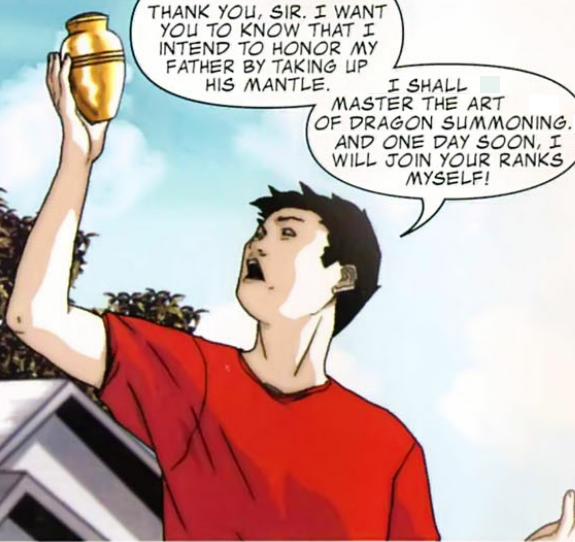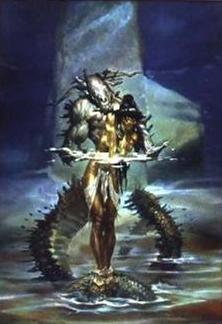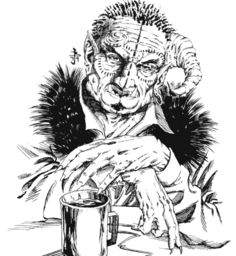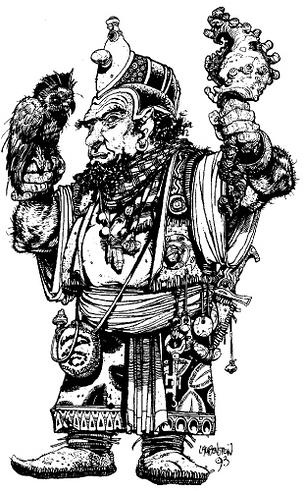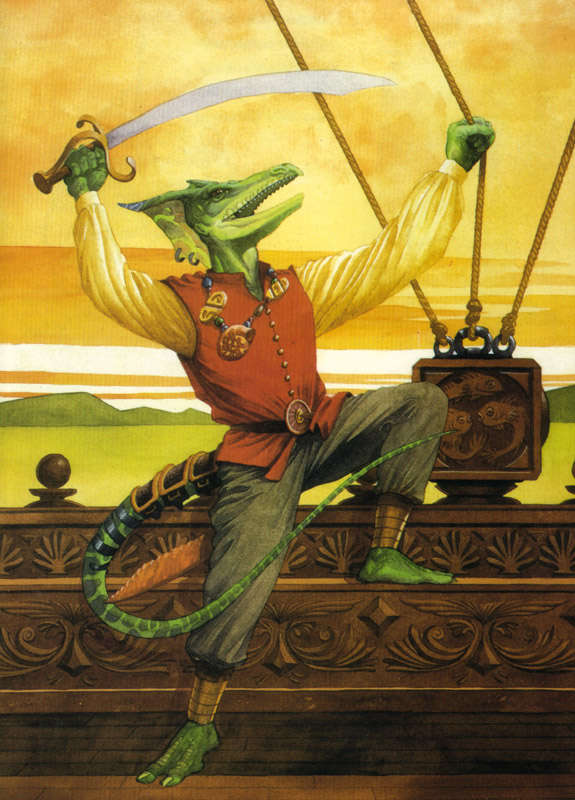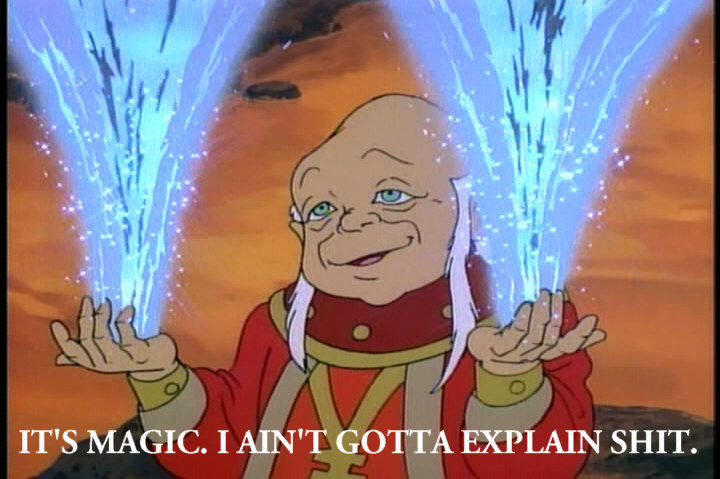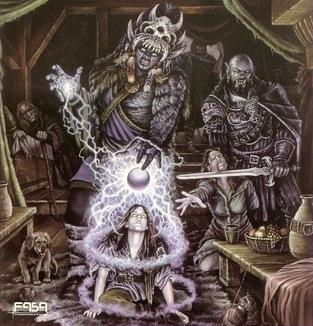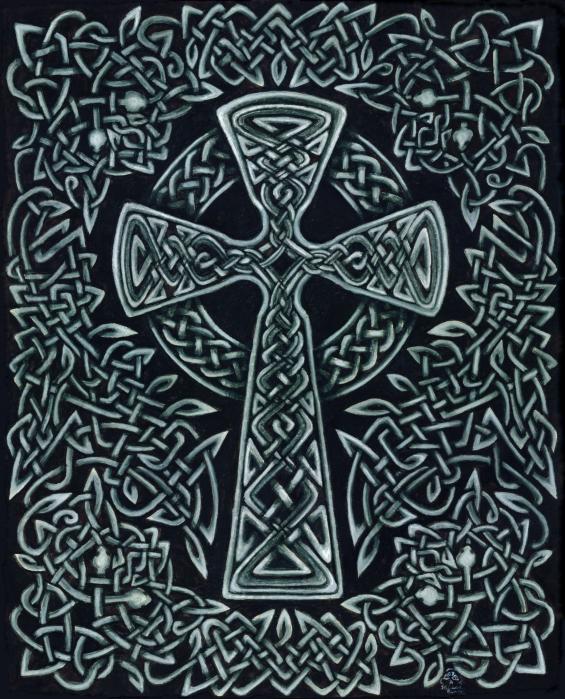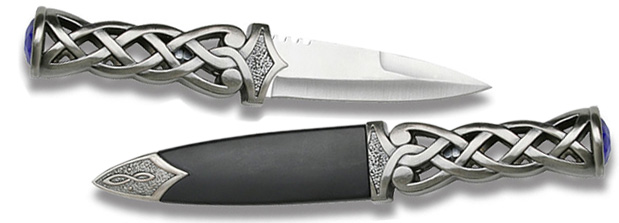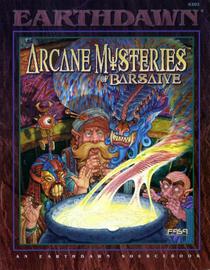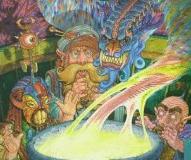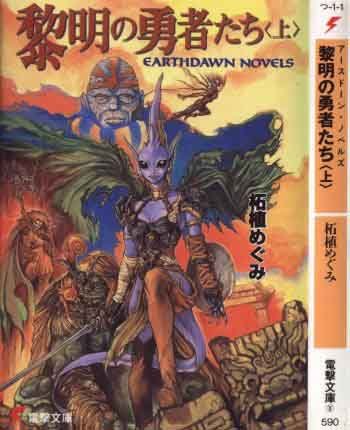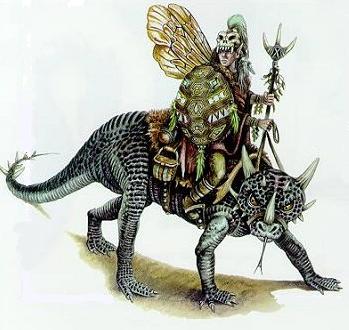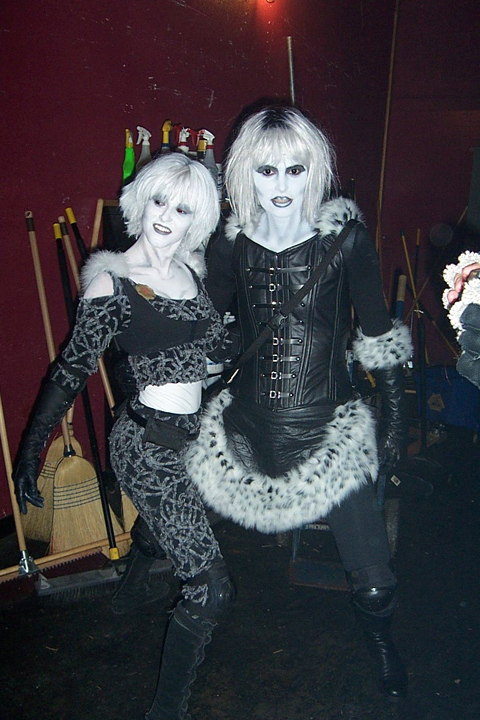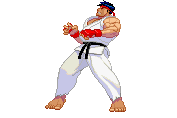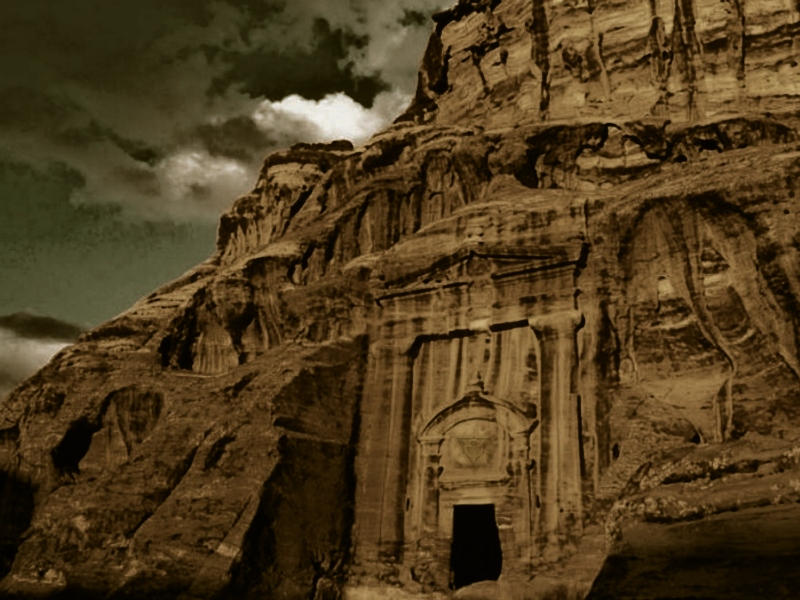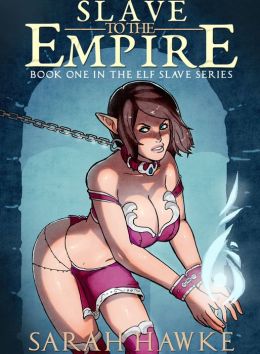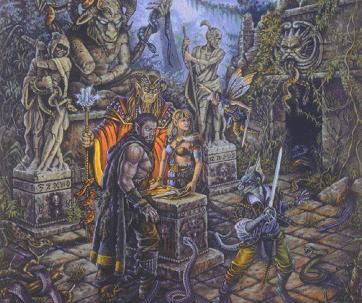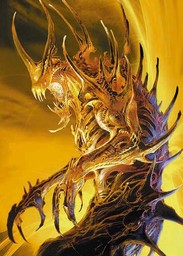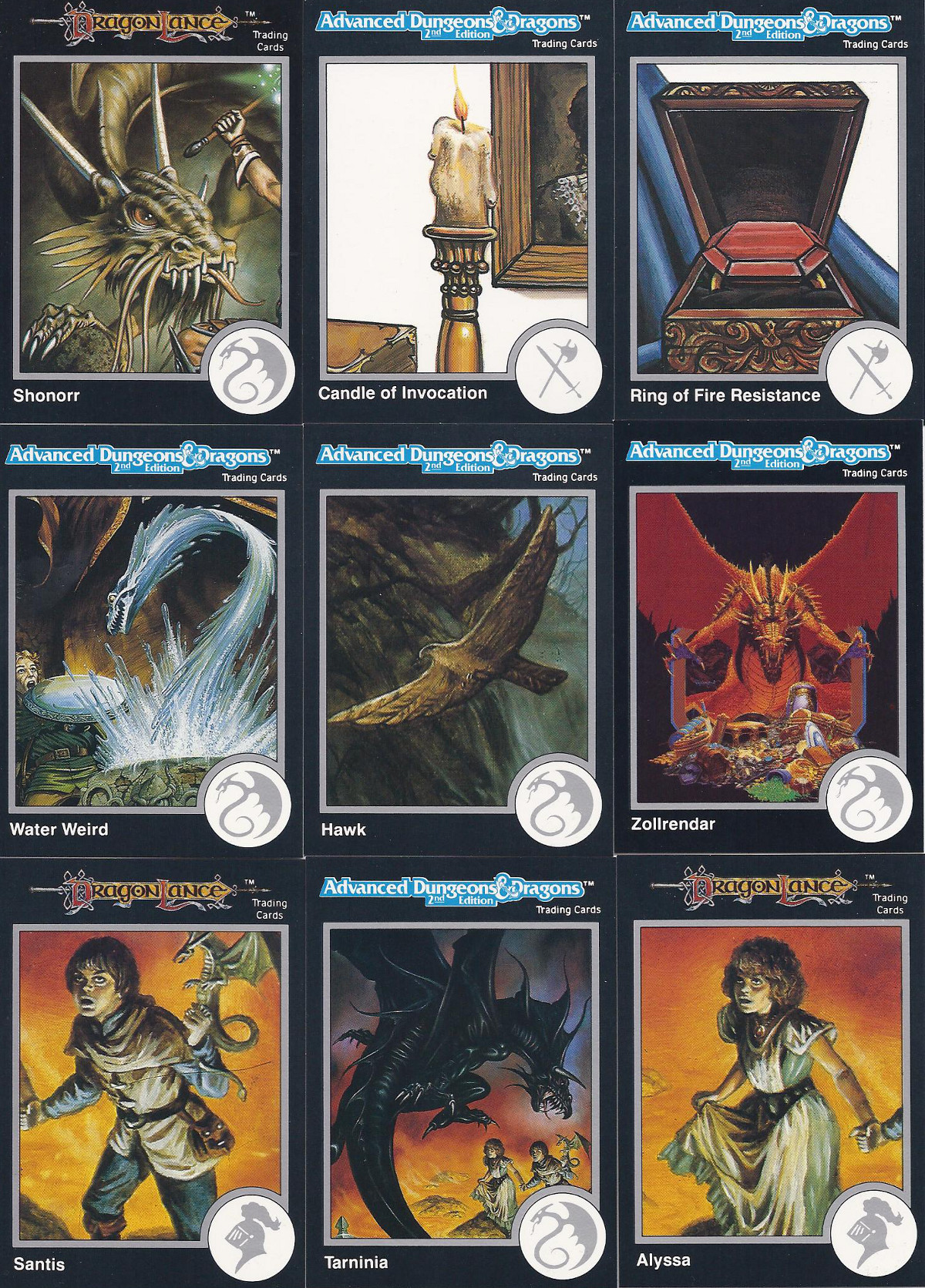Goods and Services
Of course I can help you, sir. Step right up and take a look at these wondrous treasures.
-Garrn Devia, Dwarf Merchant of Bartertown
Frank Note: This book came out 8 years after Beyond Thunderdome, so it is inconceivable that they didn't know what they were doing when they made a place called “Bartertown” that was run by Dwarves.
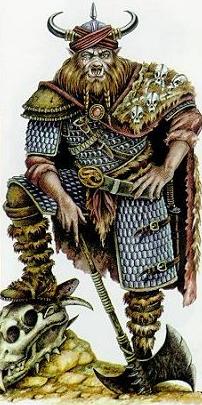 Mogun, Orc fashion model, displays the fall collection
Mogun, Orc fashion model, displays the fall collection
FrankT:
This chapter begins, as such chapters do, by explaining that you get to buy stuff at character generation with generic silver pieces directly from the price list, but that in-game purchases have to be from an NPC merchant that actually has what you are looking for. Note that this is being told to us on page 248 of the book (which is actually the 272nd page when you consider the unnumbered color illustration pages), which is a bit over 200 pages after we were directed in chargen to buy our equipment. This book is nowhere near as bad about this particular thing as Shadowrun is, but you can definitely tell that this was a FASA product.
Actually getting things... I don't really understand how this is supposed to work. You go to a Merchant and ask for a thing, and then they check to see if they have it by rolling
their Haggle step against a difficulty of their
their Haggle step modified by the item's rarity. What? First of all, I can't tell by reading this (or even from the example), whether we're talking about just their literally skill ranks or whether we're talking about their skill + attribute die step. Secondly, this is just really weird. Increasing difficulty and die step by 1 increases the difficulty
more than it increases the average. So master merchants are actually
less likely to have average availability goods. A die step of 3 succeeds against a difficulty of 3 50% of the time, while a die step of 12 succeeds at a difficulty of 12 45% of the time. But when die steps go up, variance increases. And that makes very rare items much more likely to be on hand for a high tier merchant. A die step of 3 succeeds at a difficulty of 12 just one time in sixty four, while a die step of 12 succeeds at a difficulty of 21 one time in ten.
But the real bottom line of course is that no matter how it's exactly supposed to work and no matter what the skill level of the merchants I am talking to, the chances of turning up a rare item I want are pretty low. Which means that I'm going to have to talk to a
lot of merchants before one of them has what I'm looking for. This seems like a place where the game would provide some sort of bazaar montage rules... but it does not. You'll also note that shopping at low levels is not that bad: maybe you have to go see another merchant because the guy you are talking to doesn't have the bow and trail rations you need, but fifty fifty the guy in the next stall does. But for high circle characters, shopping is a nightmare – you talk to NPCs one at a time and they each have a ninety percent chance of telling you that your princess is in another castle.

AncientH:
I think Frank misread the basic availability rules. Mister Kaer decides on the item's Availability Rating (Everyday, Average, Unusual, Rare, Very Rare) and Difficulty Number (Merchant's Haggle step + Availability Rating modifier), to see if they merchant has it, they make a Haggle Test against the DR. I assume that the DR-scales-with-Haggle is to prevent high-Haggle merchants from having, well, everything on hand.
But the
important take-away from this is that this is the sort of shit you used to have to deal with all the time in Old School RPGs. Just
buying shit was an adventure in and of itself unless Mister Kaer got bored or frustrated enough to just let you buy shit off the charts without checking if West Bumfuck, Fantasyland #3 actually carried Pearl Dragon Scale Mail Bikinis (Half-Orc sized); even Shadowrun has equivalent number systems to make it harder for PCs to just spend money on buying certain shit. While it's kind of hard to understand today when you probably could buy an
adamantine short sword +4 off of Amazon and get free two-day delivery with Prime, in the relatively recent past buying basic shit could sometimes be a real hassle.
 Buy it now?
Buy it now?
If you were doing a computer game where the merchants randomly rolled to see what they had in stock, nobody would give a shit; it would be just one more minigame to see what would crop up at any given visit. In a pen-and-paper game, though, this is the sort of shit where I normally think Mister Kaer needs to man-or-woman up and just make a fiat decision about whether or not the fucking item is available instead of rolling many dice behind a screen.
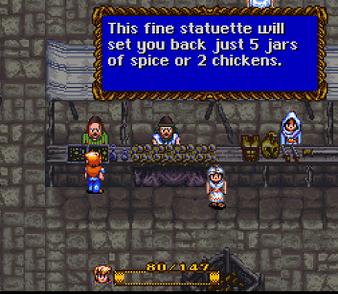 Also, prices.
Also, prices.
D&D fantasy economies are almost uniformly bullshit.
We care. We care so hard. Earthdawn put maybe less thought into this than others: it's assumed that 90% of the people in Barsaive that player characters are going to interact with use Throalic currency, because Throal is the major economic power in the region, and Throalic currency is a copper-silver-gold D&D standard using fantasy metric 100:10:1 ratios, with copper and silver as common and some arbitrary bullshit elemental coins and gems for large purchases. It's straightforward, and discussions about old coins from dead kingdoms looted from ruins or the wreckage of foreign caravans is mentioned only out of knee-jerk response to decades of reading Dragon magazine articles about treasure.
 This reminds me of a scene from
This reminds me of a scene from A Connecticut Yankee in King Arthur's Court
where Mark Twain accurately shows that not every village merchant can break a gold piece and provide change, and that trying to do so will make you look like a prat and maybe get you a hammer to the skull for your troubles.
FrankT:
You might have thought that weapon size limits would be under the combat rules, but they are not. They come right out and tell you that there are size limits of what size of a weapon you are allowed to use in one hand or two hands. Reading earlier in the book, you might have thought that weapons were sized relatively – that a short sword for a Dwarf and a short sword for a Troll would be different pieces of metal. And that might have made sense, since the damage output is weapon step plus strength step. But as they explain on page 251, this is not how they are doing it. Bigger races have higher strength bonuses
and they use bigger weapons that have more base damage. You might think that this “double counting” would make the big races over powered, and you'd be totally wrong – because damage and taking damage are split into Strength and Toughness, while
Dexterity counts for both attacking and defense. So Dexterity is inherently double counted even more, and it's totally the Elves and windlings that dominate melee. But the bottom line is that you aren't allowed to use oversized weapons. Full fucking stop.

 Sadly, none of this is allowed in Earthdawn.
Sadly, none of this is allowed in Earthdawn.
There are 6 weapon sizes, though I cannot understand why. Size 1 weapons are the largest weapons that a Windling can use one handed, Size 2 weapons are the largest weapons that a Windling can use two-handed, Size 3 weapons are the largest weapons that Elves and Humans and shit can use one-handed, size 4 weapons are the largest weapons that Trolls and Obsidimen can use one handed, and Size 6 weapons are the largest weapons non-Windlings can use two handed. There
are Size 5 weapons, but I cannot for the life of me figure out why that would be. You'd think it might come up in parrying lengths or some kind of optional combat rules, but weapon size isn't mentioned in the combat chapter
at all.
There straight up was a weapon chart on page 193 in the combat section, but the “real” weapon chart (the one that includes cost, weapon size, and damage) is on page 263. Also includes weapons that weren't on the chart in the combat section because reasons.
The long and the short of it is that a Windling can't use a trident but can use a sling for some reason. Windlings are stuck using short swords two handed (4 damage) or a knife one-handed (2 damage), compared to the 5 damage broadsword that an elf would use one-handed, or the 8 damage pole axe that full size people will use two-handed. Also, Windlings can't use shields for some reason. This probably sounds like a lot of damage and/or defense lost – and it kind of is – but Windlings still own in melee and there is no point in crying for them. In ranged combat, it's even less of a penalty – the Windling Bow has a shorter range but only 1 less damage than the normal human bow. So considering that you get to be a flying archer, the Windling Archer is one of the better combatants.
AncientH:
This is like D&D3.whatever's weapon size rules, but a couple decades early.
Weapons themselves hit most of the generic fantasy highpoints, while not going into the finer details of polearms. Also, for reasons not completely clear, the Trident is also labeled as the Trispear.

Also, total aside rant at this point: what the fuck is up with the trident as a melee weapon? I get that Aquaman and Namor have them because they're both harkening back to statues of Poseidon, and I know the Roman gladiator retarius famously used them with a net because lol-you're-going-to-get-stabbed, but as fishing spears go they're not exactly
common once you get down to it, and they were seldom if ever used militarily, so I just don't see the appeal.
Also, yes this is an unknown number of thousands of years ago, but Earthdawn has crossbows. Yes, it's silly, no I don't care. There's an Elven warbow too, just to make the pointy-eared bastards more special (on the other hand, trolls get Troll Swords and Troll Slings, so it evens out a bit). Special mention should go to the Hawk Hatchet. I can't find a picture of it, but it's the stupidest throwing weapon since the Glaive. It looks like a double-ended tomahawk had dirty sex with a yin-yang symbol.
I love this game.
Armor starts out with no-bullshit stuff like Padded Cloth, Leather, and Chainmail, and then it goes
insane. Fewnweave is a living armor made out of plants that you have to water every day. Blood pebbles are a type of blood charm where rocks are literally woven into your skin. Obsidiman Skin armor is the actual hide of a dead obsidiman, which is a bit like showing up to a fight wearing the cover of the
Necronomicon and liable to elicit about as good a reaction from the rock-men if they catch you wearing it.
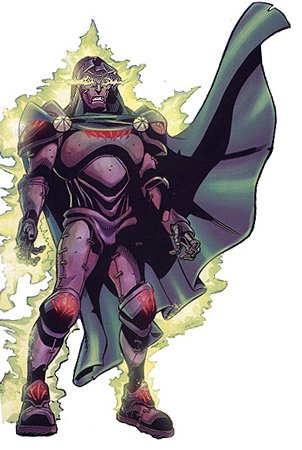 Doom is intrigued!
Doom is intrigued!
And there's normal armor made out of living crystal like crystal ring and crystal plate, and Living Crystal Armor which is again just blood magic that you straight up implant into your skin.
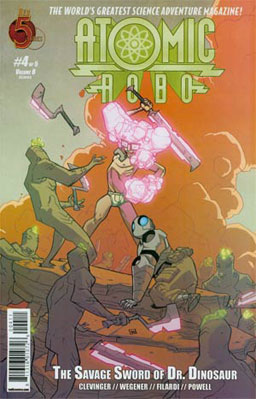 Plus, you're all set for the rave.
Plus, you're all set for the rave.
FrankT:
The special rules for special weapon effects are here. And not in the list of special combat maneuvers list from earlier in the book. The descriptions of weapons tell you what special attacks you can make with them, but not how much damage they do – so there is a lot of page flipping. It turns out that bolas are extremely good at Tekken juggling people. They do damage and also make the target spend at least one action disentangling themselves and cost one action to draw and throw. So if you keep hitting, you keep winning. Which is one of the reasons that people fight like they were characters in He-Man, and also one of the reasons why Dexterity is the “I Win” stat for combat.
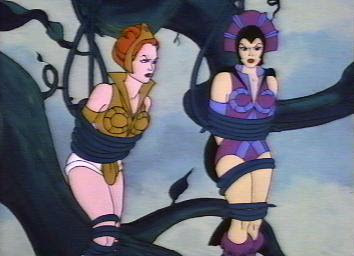 Entanglement is good in this game.
Entanglement is good in this game.
AncientH:
I think I mentioned this before, but minor magical items are just worked into the setting. These are non-thread items and the game doesn't give you any particular bullshit about nobody using magic or lack of magitech in the setting:
everybody uses fucking magic. So a dwarf in a pimp lizard-scale cloak that gives a Mystic Armor bonus is just considered fashionably well-dressed.
 Gaze upon my finery and know I am slightly more resistant to magical damage!
Gaze upon my finery and know I am slightly more resistant to magical damage!
Most of these things aren't anything the PCs can actually make on their own, and I'm kind of cool with that, actually. It's not like many people today are going to balk at buying an iPod and go build their own. Also unlike D&D, they decided to keep the long list of shit-you-can-buy somewhat reasonable.
FrankT:
You can buy various services and clothing and domesticated animals and stuff – it's all pretty much as mysterious and random about what it includes (and what it leaves out) as any price list in any fantasy RPG. There are also some straight up magic items – Blood Charms and such. But the
real magic items are in the next chapter, which is called “Magical Treasure.”
AncientH:
Magical items basically consist of potions (of the healing variety, including
phoenix down last-chance salve), light quartz (glowing rocks! child safe!), and blood charms.
 I'm upset I can't find a single decent fucking picture of a blood charm. Stupid internet, you have failed me for the last time!
I'm upset I can't find a single decent fucking picture of a blood charm. Stupid internet, you have failed me for the last time!
Anyway, these guys are straight forward: it's a magical knick-knack sewn into your flesh, like an earring or nipple-ring or subdermal implant, and your blood goes through it and powers it.
Sanity check!

0/1d2
Some of them let you cheat death, or ward off a blow, or give a desperate boost to a spell; those are mainly one-shots. More permanent versions replace one of your
eyes with a hollow magical crystal full of a ravenous glow-worm or something that gives you windling-like Astral Sensitive Sight or improves your targeting abilities with ranged weapons.
 I don't know what the word is for pre-steampunk. Bronzepunk, I guess? This needs to be more bronzepunk.
I don't know what the word is for pre-steampunk. Bronzepunk, I guess? This needs to be more bronzepunk.
And that's pretty much the chapter, except for the tables. Remember you only start out with 120 sp, so most of this shit you can't even afford. No worries!
Magical Treasure
Keep that gleam in your eye, boy. Treasure such as I have seen gleams even more. See what I have seen, and you too will risk death to hold it, to call it yours.
 This is the Mask of Oltion, one of the legendary treasures of Earthdawn.
This is the Mask of Oltion, one of the legendary treasures of Earthdawn.
FrankT:
The Goods and Services chapter is 20 pages, and the Magical Treasures chapter is 16. So really, it's like there was a single 36 page chapter on swag. Considering how low tech everything is supposed to be (not that they don't have
crossbows in 4,000 BCE, but whatever), that probably seems excessive. I'm of two minds about it. On the one hand, it's kind of more wordcount than I want to spend on the process of growing crystals on shields or the materials that darts are made out of – but on the other hand I don't think it really does magical items justice. I don't think anyone would accuse Dungeons & Dragons of being efficient with its word use, but the 3.5 DMG spends 88 pages on magic items alone. Certainly, I think you could cover all that functionality in a lot less pages by spending a bit more time on the magic item
theory and a lot less time on magic item
examples, but I don't really think Earthdawn succeeds at that.
What we mostly get is a quite well thought out explanation of
why and
how magic items work, but relatively little rumination on
what they actually do. So it's established in-world that magic items grow in power by you having them longer and learning more about them and investing XP into them. That's not just a game mechanic to establish that the magic items you get have powers kick in over time so that the initial acquisition isn't a game upending event and also that an item you've had for a while will be good enough that you won't throw it out for a new item – that's really how it fucking works in the setting. And when you do great deeds involving a magic item, it can gain new higher level powers to unlock. That's not just a workaround so that items which were balanced for your 4th circle ass can keep up when you're a 7th circle master of badassery – it's again a totally in-character thing that really happens in the game world.
But while great pains have been taken so that magic items can do level appropriate things, I'm not sure what the authors consider “level appropriate” to
be. The high level design work is done, but the mathhammering hasn't been. I really have no idea what circle the Swordmaster is supposed to be swinging around a firesword or whatever. In fact, while there is an example weapon kind of like a flaming sword (a lightning mace), and I can tell that it would take 10,700 XP to level such a device all the way to rank 8, there isn't a direct answer available for what a flaming sword might cost or how it might be similar or different to a lightning mace. It really is just “here's a couple of magic weapons that do wildly different things, design your own.”
AncientH:
Again, I'm rather at the point of thinking that the first edition of the game was still striving to figure out what the fuck it was - like Shadowrun 1st edition, or most first-edition RPGs you could name - and this was part of that. They had the system, and the way to show you what it could do was to give bunches of example items. Now, some of these are shit, and a lot of them don't look much like the stuff in later products, but I'm generally in favor of examples so I'm pretty happy.
Also, remember these? Yeah. Back before the internet, Dungeons & Dragons released entire boxes and sets of cards chronicling the characters, monsters, locations, and magic items in their games. This wasn't even anything like Magic: the Gathering
, these were like baseball cards. They even released entire boxes of cards with the details of spells printed on them, so you could quickly flip through your mini-card catalogue during the game. It was brilliant, and doomed. Anyway, Earthdawn did this in the beginning too - this very book has a couple sheets of uncut cards for the magic items in this chapter, with the backs blank so you can fill it out as you the player character figure out what it can do.
It was a different era.
FrankT:
Back in the day, D&D didn't have wealth by level guidelines, it had giant lottery charts that had an
implied magic item power by level – higher level characters would get more lottery picks and would thus
in general have more things that were amazing. This actually offended a lot of people, who wanted magic items to be individually “special.” Obviously, a +1 lucerne hammer was never going to be “special” if the game revolved around finding statistically significant numbers of them that the chances of it being a +2 lucerne hammer instead was supposed to eventually ensure that you got a better version.
 The fact that this +1 lucerne hammer wasn't worth telling stories about was offensive to many gamers in the 1970s.
The fact that this +1 lucerne hammer wasn't worth telling stories about was offensive to many gamers in the 1970s.
So a lot of people reacted to their distaste of D&D's mounds of magic gear and came up with systems that greatly restricted the number of magic items that were given out. This did succeed at the task of making each magic item sought after, but it also royally screwed Fighters every which way. After all, if you didn't get enough magical lucerne hammers that you were statistically likely to get one that was “big enough” for a high level character... you were very likely to get to high level with a lucerne hammer that
wasn't big enough. And then you faced a golem or some fucking thing that required a +3 weapon to hurt, you didn't have one, and you cried little Fighter tears.
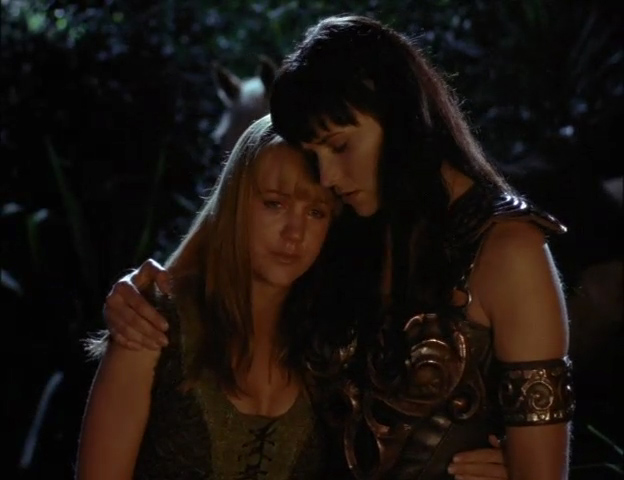 Non-casters spend a lot of time crying in most low-magic fantasy games.
Non-casters spend a lot of time crying in most low-magic fantasy games.
Earthdawn is an attempt to thread the needle: to make magic items
rare enough that they are individually special, without making the characters who are dependent upon them suck ass by denying them access to high level magic items. The result they came up with was to make it so that pretty much any magic item could, over the course of a campaign, level up to the point of being very powerful. Of course... a bit of guidance as to what high level magic items were supposed to
do exactly would have been nice.
AncientH:
Later books actually expanded this a lot, introducing some more-or-less "generic" thread items that could replicate, say, a magic sword going from +1 to +5 rather easily as well as some more flavorful (and powerful/interesting) unique items tied to specific characters and places. The ones in this book are...more idiosyncratic, in their powers and effects, and more generic in that the backstories for the individual pieces tend to be somewhat lacking. The Counterspell Staff, for example, is designed to make you a bad-ass at dispelling spells and whatnot. It does that, but it doesn't really tell you who made it or why.
There's actually a lot of good
ideas in these example items, but it's one of those things where making a good magic item is both an art and a science: what's an appropriate starting thread cost? How many ranks should it have? When do I require a key knowledge, and what should it be? This blood magic ritual seems cool, but how does that work if I'm making the item as I go along? Things like that.
Really, what the system says you can do - what the players should probably want - is to sort of build their own magic items and then grow into them as they level up. But if you're looking for a hard system to crunch the numbers on, it's not quite there. A lot of it is left up to Mister Kaer fiat.
"You have Named the sword Kel's Battleblade, and in your threadsight the pattern takes hold. You weave a thread to it, attaching it to your own pattern, and you can see and feel the energy from your pattern into the blade's and back again, strengthening both. However, you mainly use the thing to kill rabbits, and now the blood of rabbits has steeped into the metal, giving it a deep thirst for the blood of all rabbit-kind. Your first thread rank gives you +2 damage against rabbits."
"...yeah but Bob, what if I don't want that?"
"Then Kel should have taken the fucking dragonslayer quest instead of trying to grind LP by slaughtering bunnies wholesale, Todd."
 Earthdawn does have dangerous carnivorous rabbits, so this scenario is not improbable.
Earthdawn does have dangerous carnivorous rabbits, so this scenario is not improbable.
FrankT:
[img]data:image/jpeg;base64,/9j/4AAQSkZJRgABAQAAAQABAAD/2wCEAAkGBhQSERUUEhQUFRUWGRcXGBgYGBwXGBwXFxgVGBgXGB0YHCYeFxokHBwYHy8gJCcpLCwsFx4xNTAqNSYrLCkBCQoKDgwOGg8PGiwkHyQsLCwpLCwsLCwpLCwpLCwsLCwsLCwsLCwpLCwsLCwsLCkpLCwpLCksLCwsLCksLCwpLP/AABEIAMwA9wMBIgACEQEDEQH/xAAcAAABBQEBAQAAAAAAAAAAAAACAAEDBAUGBwj/xABCEAABAgQDBQUFBgUCBgMAAAABAhEAAyExBBJBBSJRYYEGMnGRoRNSscHRByNCcpLwFGLC4fEzghUWQ2Oy0iRTw//EABoBAAMBAQEBAAAAAAAAAAAAAAABAwIEBQb/xAAuEQACAgEEAAQFAgcAAAAAAAAAAQIRAwQSITEUIkFREzJhcaGB8AUjQpGx0eH/2gAMAwEAAhEDEQA/APGxBpEMInwmGMxaUJbMosHpXxiwqIzHRdl+xEzHS1rRMQgIVk3gSScqVPTxENK7DYg3MpP+4k+iY7nsXhzgZK0KaYVrzuN0d1KWq/D1jUavkr4fK+onX7I2eJEiXKFpaEp/SkB4nmYdx3UHg/8AinrGQe0B0QOpJgTt6Z/KOn1MW+JEFoszNw4aW5dKHNS4HnCl4CW5IQkZndgzvclrk0jnl7VmKuryAHygVY2YbrV5mD4qKL+Hz9Wjof4GWl+8HAHeUzByGru62aAlCWgj75TAmil5noRXM5IjnCSbkwnhfEZVfw9esjdXiEAuMTM0owUKF/c1t4GIDtMpZpy1cXlps9ahjanQc4ySscYUyYE3pC+Iyq0OJdmrK24sKLstJdg2UitA4d28If8A4+tu6jyP1jHTiUkOC4t++MEia/HqDC3sotLhXoaMzbEw+7+kfN4rTMSpVz6AfCKpnK9w+Y+sEFKY0APjGXJsrHHBdIMGHhq/v/ECtTXtyBhFKSOtwqSUJOY1SOHDwiTIeI8v7xX2PMBko6jyJi0tmJ5GOi+D53Iqm19TjZqqnxPxgQYdob2bltTHOfRKkjodjIIlOXqSelokn4cKuOcWESsqQkaADyiLETQkOf3/AGis4x2+Y+dyS3TbRQ3kllbwJoeHJQ+cc5287QfwmHyoP3s10o4pDby+goOZEdLNWJSFrWpkDMtRUe6AHPTWPDO0u3FYvELmlwnuoT7qBYeJqo8zHmQjul9DXRltDQiYQjsEIwDQcM0ADQodQhQUAwjQ2NMy4iSf+4geZA+cUkCNvspsGZisQgIG6hSFLVTdDuCxIJcpakNIcXTTO/VOINiRyDmDTOJdkqFuHXrHSo7Py+K68/hSD/5fl+8seBHzEb+Gz01rcXuzmPaTPcHiVN8AWiRWejZRxq/yrG9/ysn/AO6dZvwcL9y8OjsojWbON7lIv+VIg+GxeNx/UwBImarHgEj5mDKaMpXWx46vG6nsfKFlTOqiet4lHZKU7lyeYB+IMGxj8Zj/AHZzSVS0gfeUcsSrXWvX1gpi5ZYlyDYjMRccNLR1SOzkoe96fIRMNhyuBPUw9jM+Mx1/w5ALRYS1XbuFqUeoYimkSGYQN2WT1A4V/fCOvTsaV7nqfrEg2XK9wQbBPWw+v4ONK5hslIpqrWnAVh0iZrk6Oa/SO0GAlj8CP0iDThUCyU+Qh7DPjo+zOIEpeq062T5XMSJwiyAHU/FIbpaO2CRwEFBsMPW+0fycSNkqOk2zXI+DRKrZs1KN1BLDUtTmY7CBmIcEcQR5w9iMeNlfCRk9nFqMshQFDpW8aGMLS1nglXwMZfZkkBaSXNC7NxjT2kWlL/KfWkP+knmj/Pr6o41M5JsYv7Hk5pqeCXJ6f3aKikA3jb7OYZgpXNvmfiInFcnqaiezG2acyM+ctQU7Zk8NR9YuTlaRi9o9tpwmHXOVXKGSl2zLNEp8/IAnSOfUZNz2I8SC9TiftT7SM2Elm7KnNwuiX17x5BPGPNTE+LxSpi1TFnMtaipR4k36ctBEJjUYbVRtgw6RChwI0IEwIEEYcQACYaCVDQmMNIj0D7IVffYgfySz5KX9Y4AR2v2WzSMTNZOcmUGT4TEg3pYxSK5Mvo9YwszMkKLVqANBwNamLIVFDFJUoboUkgkXIpVjulq7pD2fpEYmYo2TKHM5uWlOcdBOjXSqCeKC5E5SE1QlYJJNSO6oCmrOD0tCTs2ae9PU/wDKAOFqftzAFGi8EIq4PZykO81a395j5UpFoSeJPw+EAFfE7RlyyAtTE1sTR2eg4xJKxiVJzByOQ5kfL4RKMOnWviX+MGJAGg8oVhwAmaCLtycP6Q4V4+R+kTCHhWHBFXgfT6xRGHxNd+Vo26RUO4uQxp4Fzqw03hQDspDBTCghU2pDOEs1ADlANNTUm+sS4bCFAbOpVXc1Pq9IsEwoAsjMrmo+nwaIJawSaGhIFSRShvq7+UW3jPn4me6gmSkiuVRmAA8CQAT/AI5w0FsztismetI/nHkp40dsFpK+nqoRnSzlxlQzn/yT9TF7bp+5PiPjGPQ75q8sH70c0Y6bBSvZyUjU16msc9hJGdaU8SH8NfSOnxCtOERlLZBstrpXUP1K8eLfaJ2m/icRkQXkySUpayl2Wv8ApHIE/ijvPtI7T/wuH9nLU06cClPFKLLW+hqw5l9DHjEc2GF+ZnnsGGh4UdFCGgjDCHJhgRwQEMYKEgI1GFDmGhUM3+yWwRjMR7FSygZFLcAE7pSGr4u/KPY9g9mcPhUp9lLSFhIQZjDOoUcqIu5AMeS/Z3icm0ZNmUJiD1QpXxSPOPYcRmZGTPQ1uaB6Gody1axfGicrNQGDBjKTiZ5B+6S7m5YGt7k1H70iRK8Q/dR4E5RzNCo9IqYo0wYMGMtCMQe8ZYoO6Tdw90m4ceUXpSlEXS+rOQ+sA6JwYcKDtrw1iJjxHkfrFDFrlhRMxZQ2V2AAU9BoSoVA4OwGsAUaq1gByWA4wQMYOFm4ZKCErWsFINyXHdpQNatotqxiUBGVMwoZNUhat0hTAAVd8uljCCjVeHij7TeSMiiDcly1/EcPPlFkSU+6PKAOAzMAuR5xSmbWSC2WYqpG6l7WNNDxgp8yYFbiUkUuQkc3ZyeIYC14ErmqSxyJU4dipiGqOIrr/gzeSMe2aoOXtHN3ULbiQQLG1KsQ3jEqJqsynTu0ynU8XBAb1iulM1qzAK/hSLVpvP58obaGKKJZLl2IHXWlIn4iF0jccbk0kZeI28oTTlNNAQ4owv8A31i9I7QJNFjLzuPqI5dSCTmSyms9PEcv8QUrEEkgpILPW0aUmexLT45Kmv7Gzj5o/iELSQRuFxyUQR5ARe7Qn7oc1D4Kjm5U19PV/DnztFzE7RXMSErLsXdq6wXww8P5oNeha2BKdZV7o9T/AGBhSu1WGmSV4hE1KpSASpQLlIAdiLgtprGXtjansdnYj2WYzlJKUhIJUCtkZqCyQSrpHiKVMCAWBYEDUAuARqxqx1ESyR3JI4NS28rbNDtDttWLxC5y6ZiyU+6gPlT5VPMmM14UM0NKjmGMNDtDNAASYZZhwmkMsQ/QAQIcwgIShCAAmFChRkZs9lcTkx2GVwmoH6zk/qj3KZhlliFhBGarOKl00cAtz46R8+4OdkmS12yrQr9KgflH0HPkSyBnYB6G1TWh0i+P1JzDTg5hZ5x/2oSHvSrnX0EF/BuCJkwkqIOgYgfhpQUJ/ZgBs+UwFSxzDeU4LM4LuKfODk4KSgulAe768i5hvNjXbMqLHkYSWlWb2ilEU3pj1GV+tjXjziSTtGQ7JmIc1or9te3OG9mj3EVqd0Xu8JOLSKBSR4EU8rRJ6uC6NbGWP4xOgUrdzBgWI5E0fleBkYhJciWoHmgJJ86esIGHQtw4qDEZax+iNbCVM40JSLcah7i3hEntzFDFYzI26SS/pZ/GBRiVrBZCkGjO1nAJGlnIflS8ReoyP1NKCNDOYRUYgSpTCgB1rrqzAxTGx6upajaj0pa71diTxrSJOTl8zHReTiUktmDuR1FCPOkBi8cmWN4nUgAOSzW8x5xD7GSCVlSXSA6ioBgCWdiAKv5Q38cgMUIUpw4KU3BtWFQwv+JgkBKFqJqKMGdiXswpzrGVt3HUSlYazgcSBYvpXh0jTxeImjN7NCGH4lkgc6AOfSOexWJUVlWVwbt9DpF8MbdnXpYXJy9iGVLH/TVS2U1F+F0nT5Ug501rpJTqWdr3EIJSCSGGhNh4fDzgB7RPBYc2oa+JaOw9HpAJkpXvSyx5cfiDBz5qkixLAWDvx8P7w4mIU4O6ToaE/WGRKWlmU41Bv0b5wB9h5WJSuxBIuNYobR2Bh8Q5mISVe+miuPeTXoYt+0SpTEKSq1iHBfUX+UAJCkf6eUj3TTSwI6QA/MqfJxm0vs8mJcyJgWPdXuq/UN0nomOWxmBmSlZZqFIP8wZ/A2V0ePW144JLL3aCps9XAOukHPQiYkhQSpBuCAoEQjlnpYS+V0eNw0eg7S7BSV1kqMpXDvI8iXHQtyjlNo9mMRJO8jMn3kbw6jvDqG5wHFk0+SHaMtoBUFm4QBgZzhCBUYOIyYGA0KGhRn9BhKFD4H4R9B7PxSVSJS2zZ0oUGrVSBWtqax8/Jj3HsPis2zsOUjMRLCWdqoJQa6WiuMxLo0MZOWkpyuQTYDQMSLFyagd2ENoKJGWXrXMWUBxy6+D6QeJJSgqKMymfK7upu6HtWkBNxqwQESSoEAuCAx4F6eRMeZKNOiioMTJx0T+Gzg23hvDjQRLiMIZjOSlhoo8UmoDPb1MRJVPLUlp4uSTpwpx9IkVhVEkmaoJOgYN1b40jIwhswUdS+hZ6vW78PANaH/iZKNwrD8ColyovbUkl+sRyJUpTpK/aOA+ZWZwC4tQ3+Dw5xSZZyIlKJHuJDVFK0DadDB2Fk2HxwU4QhVnBKSlJPB28NNfGJETZhCnQEKbddWYO2rVFWiJM+aoOJYTwzqr1yuBpR4NOemdSQKggDvEkBJBd039YKEMnDzT3poA4JT4amvGGVhpZVlWtSiQQxWagXDJata6mIl7NkhLLJUAoqGZVcxBBYitjaLsnBIQ2VCQ1mEDYFWVNkpBVLlFRBynKje0LHMxag8osKxUwhOWUa3zEBq+p9OfGy8O/hCsDG2oZmRJWQlRulBUUswpVnYvVg9KRiLSsFwQocDQ9Dx8o6XHbOMxTlTABhTz1/bREnYidVKPgwjpx5IRiehhy48cKb5MLMFMC4JeljS9ojQgiqFBSeBtpYi3lrHTDZEvUE+J+kFL2ZKTZA9T8Y29RE09XA5mcsUCxShBNn4eMIyy+ZKqHQ1BpRjpHRbTlASVlKQ4DsANKxzJCVdxWUjhpyIPwimPJvVlsWVZbaErFlJZaVAe8Kp8aEkdYeXJSC6CRqQC4qNQbQpq1ByBmHAFutvSIilC6h0kcDlIfQjiYoVEVrAOdIUG/DV+WWAlykGsstoRp4MbGJSFpF85fwLN8YjmTUKYK3SWNTlNGp4whff8AP+x/aLBOZNKlxXwDQSZjgWD2r8OMD7NQsc35tB4i8QzciiQtJSQ9a2cWI5tSEbuuyptPs1InuVIAUfxJ3VdWv1eOU2j2DmorKUJg4HdX/wCqvSO4EoghlEj934wCsYAplAjhQ1gI5MGOfLVHlWIw6kHKtKkq4KDW4PeK5j1zFYdE0ZVpSscCAY5raPYWWqslRQeB3k+tR5mA4p6OS+Xk4doUXdpbGmyCPaJYGgUC4Phr5iHgOKUWnTKiY9g+y+cVbPypLFC5ifB1Zx6KjyBMeo/ZSjNhJ6HIeaagsay5VjpG4dmZdHcBKh3yCTwFPCK0szyaiWkdVHlZmiaVhMg761/nL+TAAQOJxGRrc3uwvl4m1H844dQqyMceh04VZBStYIIbdBSQeRB/bCBRsWXTMVrI1WtR+bf5iP8A4xLZ948spfjY/u/CLA2gHSACXaoFAC9+dLcxEOTdMnlYSWnuoSNaAXd38XrE4MZasVNHclrWT7xCUgubPUhuHDiTBpnYgkbiEpdLup1N+IUcO9oKYUaYMIoDuwfi1eMRBSuA8z9ICfhysMVC70HpUsRGQotCkDKxAV3S7fQH4EHrFTD7OSguFLcBqmmlgzCw8oL7tFSoJcs+bKCQ50ID3h0goNW05Y/GLPqTRtAH1gcVtVEsgFySCWDZmBaxIP7o8VVTcOgpZKN4llBL90EGoBqCw6xZl49JcISosHoggHkCQATGqQcEicaCjMASa7oqacG46REMeuv3K2HMP0D6fIwS8YqmWUsvxKUtcVc/B4SZswvuJTwdWbxsPCAApS5h76UjkDbrr5CJEZmD5X1Lm/gwivPTMIP3iUVcFnOVjTeo/PlApwamDzphFTQIDghmcJtrTXlSBpATz0EpUCRUGw5eMcyUg9eh+sdQhDABydHLP1YRiy9krOgSOf8AaL4ZKKdndpckYp7mZpSoAZS5/m4dNYCYsEJC01VRr1NGcePxjoJOxkjvEq9B9fWLkuUlPdAHhFJZ4ropPVRXEef8HKLwqkBgSDfec09IjmrBOVaHBoCzjrwjZ27hapXV+6ejkfExlkxSEtys6MUt8UyoMKK+zWU1t3kvzBtBTlkDeAUGrq58PXpDrwiSXDpPFNPPQ9YSyoCm8X8C3wEaN1RXkS0HelKbkLfpPD6wa1qA3hmtYa60qwhpqULbMGOn4VBn1HhCTLULKzDgRXweAS+n4IDhkqqhRBfjrqLv5GJ8zX84rLUhVJichemldGIpEs2YJcsqJokEkk6CtYQ4s4jtljs88IFpYb/cpifRvWFGFPxBWtSzdRKj1Lt0t0hQ7o8PJNzm5AR6h9kS/uJw/wC7/wDmiPLnj0b7JMSkJnIJGbOlQTqRlZwNaiHB+YlLo9JmMR/f+8U8XNTLTmIKg4DVUWJDlq2DnpFvPSKk5ZCTkG9pRw5LPp43iGrXmTDG+BhtBAUQELce7LJB8CkNEyMaTlaWtiHJICWvQgl831vECMXNP/SamqxfytBBU4j/AKaTTipuPDN6Rxmw/wCKnG0kChusX0sLc78oNInFIcy0Fy7AqGXS7ViBRmLYJmpQvLvJYLYnW4IY9Imm4clQJnLTYMMoBNOIJ8uMHADpwcw96eo/lSlPqz/sQ07CJ7ypqwx1mZR4H96DWK0z2KRlmLU3edar5nNDrY20BFqQ8mfhpaTl7rhJDKUXbMHBcmlX+kPn9oYU2RhsqPaFKmGQKJJBysC9WuRfjCkYvDkMhD/i/wBM3FB3hRWgBY0g0Y1KR93JmXZhLy1rVywal+YiaTjFqvLWlw7nKQCXoQFPS/WABsPj3S8uTNG9ZSfZ3qVbzOHJ9YkTPmHL92E13nU7Dk1yYjkqn5t4SsvIqzX5hrc4SZE6rzUsXZkbwdmLuxIrpqOFTgQeSapwooAILZczg6F9RypESdnzGYz1tbdSkFq6lz15RZkySAMy1KI1LD0SAIkSoNRunHWFu9hleRs4JBBWtY3WznMXBUXfr6QsPsmSggpSX4lSibNcl7Q+LxoltuqUS7ANp4mIlYiYtO4kJL0zvZjUhnexb1g5CjReK2Ix6Ed5QH14DieUR4fDqDlSyX08veJ86XMArESkklLKXR8u8vhVq0hVyAcvGFR3UEpFMxpWlnuL14pMSISphmIdg5HHjX6RCZsxXcSEjiu9Q/dTqDxMQrkJQc82aot7yglAejMGHKr3jQB42UlUskF7kF3qDUD1tGBG9hMZLUwlglNnCSEeAJZ+kYeJl5VEcD/iOnA6tHo6OdpxIyYEmETDR0HeDMlhXeAPjFb+Cy9xRTyO8PWLJVAwhOKZVmzSEtMS4apSKeTuPGMLtjihLw+RNDNLNyur6dY6RUefdssdnxGUWljL/uNVf0+RhM5tRLZjb9+DBhQjChnjjwcmcUEKSopULKSSkh6FiKiAh4ANBXaHE5CkT5zMW3y+pv3j1Me1YLEmZJlrTdSEKrzAJ9I8GEezdjZ+bA4flLCf07vyiGfpDRrZZrjfQAwzAJJrV2L2t5c4SMHMYhU9ZfUJSkj8tD6vEoiSOSxkUzZiVZSorJAAfMQ4D3ysDeEnZEkMSgEixUSo66qJ4nziYERKloNzAGVIQAAwOUACgJYBhE4MBmiJeJY6ZRQkmxIJ+n6hCuxFl4cKjLmbaTUS3mENRNbkD6noYKbJmFToORy6id5wAwATpxuNeLw9r9R0aWaIcVOKU7oBVRgS2ofxYOW5RUThggmYuYX4k5UjkG08SYNGNQ6hL3lC7WfgVWeCvYB0e1UN4gApIoCKnWpJDcG6xLKkZAXUwJfgBo1bdGiJZmqsUyxzGdVQOeUEHMLqEQzJEpO9NXn4ZyCHrRKRR+TPSGFlk4tCSAAVKIB3RmLGxPAeML2k1TslKBoScxvVwGA11iCXjFEESpRAo2f7tJc1oASKVtXlCGDmF880s5ICN0sbAqevGgEOqAebJCUn2y1TASHBYAb1KJYgPxJtrClYgZSJEtmZnTkQa1Gh6trrDSfYoKsmVS9WIUs6tUvBmfMUBlSEvfOagObBNyaai8Agkomq76kpDWQC4NPxE+OmsBMElKt5lKckAutTmpygu3SAmYYGs2Yo0Yh8iOZYGr8CTDSsWlvukE2FE5QwcDeIAIHzEH2GXJc8l90gUYnVxwuGtWMjbMplhXEfD9iLipcxYqv2fEIZXkpQ8NIj2nKeXxZj8jG8b2yL6eW3IjFeBJh4AqjtPZHJgSYYwylcYAIsXiBLQparJBJ6B48pnTStRUq6iSfElzHbdtsdlkiWDWYeP4U1Pqw6xwxgPK1s7ko+woUNDwHEMFQTwEPCAkEeq/ZvOfBAP3VzB5qzf1R5QI9F+y+cPZTk6iYFdFIA/p9Ijn5iNHduP2YMEfsRCFwQVHEMnC4aYvdIDuQW8uVojCjDTVqY5GzaPZ+cMCMyZqlOVZB7rvRmYs13PpwDSKwiAlll00fMWS4AAcWNhd7Q3s1lTlbJ90D4k18miBcuRLLqYqSH3t9YFnDuQA+lo0MsDaCRuy0KXQEBCWSxZt4sgUIo8EtM1f4ky0kVYZluQLF8oYvVi9IgTipqxuI9nwMy/jlSaNwMSzMJmLqWtvdScqX6b3R4OhDezlIbOrOpIVVRCle8qg18BBoxqlEBEs5QzqVuAcgO8S1bNURFJxsoqJQyiSxUlJPG6gK8G5weecoWRLtffUOIYML6uYAJfYLLZ12ckJAAI4HM5Iv5xHJVJSdzKpYBZiCpho5PpyMRzZaEpHtpmZiCCshIzGgoGHTmYOViwd2WgsA4OXKh2oAT8hABIJ00tuJSNXU6j4MGB8TAKwyUgCYtagSAHLAm+lSfE6Q6sxSfaKCPyGw4ZiPgBEKZklFjmVQs5mL4A6nrABMnFABpSM3gMqOFzQ9Hg1IUSDmy0qkMfVqRH7WYo7oATXvPmDEi2vHSAmyA4UtaiaAAKypJ5Bw5PMwAClMkLYkKX/Mc6n6923KJVT5hG6gJ/OdPBP1iGTiQA0uWrnQJFdX/ABdHgihagHVk4hNfCpFIf3EKcgDemzTl4OEJ46VPU/OGk4mWoZJYdJDUDJAL6mh6QylSwakKU35lFm0GvSJZc4mpSU+LP6WgGjAmJYkcC0A8UO1e3RhsQAtCiiYnMFJa4LKBB4UN/wAULA7alTv9NaVHhZXkax3Re5Jns480Zrh8l4mBJhiqK2PxYlS1rP4QT/aNFW65OG7W432mJUNEDIPG6j50/wBsY0JSiSSS5JJPiamGaEeDOW+TkxQoaHgMiEKGhQAEDHb/AGXzmmz08UIP6VKH9UcPHT/Z3NbGt70tY9UK+UTycxY0eqgw4MRgw4jgGSgwTxC8PmEAEU7CoqZkxRBqxUyQODBn6xKmekEZEE5m3gAzNQlRvoNYhnqlp3lhzYbpUaOzAAmHOKWoHIgilCuguGcDeFH00jXYyQJnKZ1JljUJGZRL8TQU0Y+MIyJUtlLLmjFanLizPq724wC8MpYImLLHRG5Srhwc2vHQWhDFyxVO8auUjOa3cjwFzoIBFmXi8w3EKalVDIKvxr6awEwLuuYEClEsz0cZlVId+BiPNNJuhIc1YqLPSjgWaGBQlyuZmFjmUlnpRgAP8wDJ0TUPustYFKuaaP4/GHVMmKsEopdW8XpTKG0fW7RXTiXDSUhg1wUhi9RypEqELI3lAFmIS7a2eov6QxDzQlNZq9CC5CUkF3pY3ArygUYoANJlkh9AEJrV6s/QG8RhUtFt4hy1ZiubXMFMmTFPlypGhU5Pi1G6wASTJSlXXluN2lOtj52o0QIXJQS28oMSzrVYNxNmgpmHTUzFEgggglkt4Whk4oMBKSVUDMGS1GqaWgQEipq1DdTkrdVacWBvyPLwiKdLSGM1b3FTlFb0F/WDKVl3ISDoL24vTygUYVIamYixVvK11PifOAA5c4MAhNLOAAluI4wOSYbqCfyivmr6RKVQJVCsDkvtLwGbDImXVKUHP8q2SfXKekeZgfvnHtm18KJ0ibLNloUH5kUPQx4l4x14HcaEzUwXaafKYBedPBe96971ixtntR7eSEZMhzAqq4IFQ1jdtIwTDRcos0623wORDNChjASE0KEIUFAKE0KFCGKNLYO0hh8RLmkEhJLhLOQUqTrTX0jNh3hNJqhHfTvtOT+CQs/mWE/AGKk77S5p7kmUPFSlfSONhPGFiivQdnTTPtCxZsZSPyo/9iYpTe12MVfEL6BKf/FIjHBhCNKEfYLO5+z7bswzJsqYtcwqQFozqKqoLEOokh3HlHcn2itQihtvKfStqeBjxzYe0fYYiVM0SoZvyndV6EnpHrpkm6pqmd6Mkcg7OR1rHNmjTsaHmypYb2qsxsM2t/wihNeETpxJIZCDahLJTZxzbSgishaEk+zSCpVXAJBcUdXT4QYVMV3kpSmjgkqJ8mA9frECYylkl5jDQJABZrFRd/IQIXLSuiSV0chBJ6qb5xXOHQhP3i1KAbvKpwsGF+V4lRijZCHSGqTlFQ4ajmGMnUqYXbKitzvUrVqMXaGmoSKzJhalzlD6MzVeBCVkbymv3eBDXNacmgkSEguwKuJqqnM1hAOnFe4hRBqSwSPHeZ4SZcwvmWBfujTnmerRJnhZoVgCjDpBcuTTvF7PUPa+kSlcR5ow9tdpcLLpMnDMHGRG+qvEAFqcWueMFOTA3Jk4C5/fxiJOJc90gXct5/vjHn+O+0Sv/wAeQlJ9+bvK8kn+rpHN7R2/Pn/6s1ah7oOVP6U0PV4usLfYrPTto9rsNIcKmhSvcRvqsKFqDq0cvtL7S1mkiUE/zTDmP6RQeZjioTxZYYrsVlzaO2p8/wD1pqljg7J/SKekUoUNFUkuEIaFCMKGA0KEYUAChQzQoVAKFAgwUACh3hoTQAO8PmgQYRMMAnhxAPBGEA4rHqHZ3Hy5uGlLmDMvLkUSMxKpZCX8TQ9Y8ujt/s3nlp6dAULHioKB9EiI5V5bGjtE4lRfKkihYqoHo1LtfyhkIWWKl20SGF+bmKWJxinYFt4B9WObjTSLAwgLFRUosLmlNWFHo9o5K4sYpU2UksneUKUdauFTXg1eEXJc4kVBHi3yiMQiuE+Rk+eHC453tXtteGk55YSS4G8CRUgaER55je0WInj7yaog/hByproyWfq8bhjc+Qbo9R2j2rw8mi5qcw/CnfV1CXbrHMbQ+0w1EiV/umH+lP1jhRCJjpWCK7M2ae0u0WInv7Waog/hG6mujJZx4vGaIaGeKqNdCCeE8DCIhgE8M8MDDQMAgYYqhhDQAFmhZoZoEQWATwnhhaGgAJ4UC8KAD//Z[/img]
These are 3x5 cards covered with descriptions of Earthdawn magic items. Back in the 1970s, that was the standard way magic items were used. A character would be basically a stack of 3x5 cards, where each magic item would get its own card and if you transferred your character between campaigns (or convention games), your new DM would look at your stack and tell you which items you could use and which you could not. Earthdawn is definitely locked in that mindset. To the point where the basic book literally comes with cards to cut out that have pictures of magic items on one side and space to fill in the known sequential powers on the other.
 There was a time when TSR thought this was a good idea too.
There was a time when TSR thought this was a good idea too.
AncientH:
Individual magic items vary from underwhelming to "neat, but boy that seems expensive." This is usually because you've got mostly straight bonus that increase every thread rank, with the
occasional special ability. That's not always the case - Spike Bombs start out as blood-magic fueled regenerating explosives and just do more damage as you go up in rank - but it's typical. Generally, the cooler unique abilities are reserved for the Unique Treasures in the back of the book.
One thing I would like to highlight is that these items have two ratings: "Maximum Threads" and "Spell Defense." SD is the same as for people, meaning it's what you need to roll against to weave a thread to the item - so, higher the SD, more difficult to weave. Maximum threads is what it says on the tin, but what it
means is that more than one character can have a thread woven to a magic item - you can't just pick up the evil overlord's magic axe when they drop it and gain access to it's power, you have to weave a thread to it first (and, of course, if you're strong enough you can
unweave his thread to it. Ha-ha, dickwad!) But in a game where there's few magic items and more than one PC that wants to benefit from them, it also means that different characters can each weave threads to a single item, and both can benefit from wielding it.
 It's the pre-WoW equivalent of a couple saying they're going to level up together, and then he comes back one day and find she's got an Epic Mount. Also, the in-table "My turn!" fights could be epic.
It's the pre-WoW equivalent of a couple saying they're going to level up together, and then he comes back one day and find she's got an Epic Mount. Also, the in-table "My turn!" fights could be epic.
FrankT:
One of the places I think these magical items really fall down is in
how you unlock the next rank. Each one requires you to
do something. Sometimes it's as simple as “research the name of the dude who used this in battle last,” which is pretty much code for “spend some downtime and maybe some money to unlock the next level.” But sometimes it's a lot more involved, requiring you to
go specific places or
fight specific monsters or something. This is basically bad, because it requires the other player characters to agree to go have specific adventures before you get your next helmet upgrade. Sometimes players in fantasy games really do have nothing better to do than run Molten Core to upgrade the equipment of one party member and then go somewhere else to upgrade the equipment of another character – but sometimes there are actually plot relevant things to fucking do, and equipment upgrade sidequests necessarily take the backseat to those things.
In short, a lot of the sample Earthdawn items give you a tangible reward for fucking around with nothing on your plate as adventurers. And that is frankly bullshit.
 The hands represent perverse incentives to do trivial sidequests rather than plot relevant adventures.
The hands represent perverse incentives to do trivial sidequests rather than plot relevant adventures.
AncientH:
On what Frank said: there's a lot of talents that are specifically about figuring out what Key Knowledge or Deed a PC needs to know/perform to weave the next thread rank; it's part of the reason why Troubadours and Weaponsmiths are a thing - besides trying to justify Bardic Knowledge, I guess.

"Legend has it that Arthur drew the sword from the stone. Perhaps you must put it back."
Other than that, there's straight-up Call of Cthulhu-style researching, where you read up on the legends of the guy who Named the thread item and what he did with it and all that.
The unique items are a little better than the "generic" thread items, or at least their powers are more interesting than just straight bonuses to damage/armor/etc. There aren't a lot of stand-outs here, except maybe Purifier - a rusty sword that at rank 6 lets you use blood magic to one-shot a Horror. No, seriously:
For a cost of 4 points of permanent damage, the wielder can use blood magic to use Purifier to slay a Horror with one blow. When the wielder invokes this power, he takes the 4 points of Damage and then blade becomes searing hot. The Damage against Horrors and Horror constructs when using this effect is the character's Strength step + 35 steps. A successful attack against a Horror automatically inflicts 10 Wounds to the Horror.
So...yeah. +35 steps. That's...I don't want to say
inconceivable, but in a game where rolling a couple dice at Circle 1 is the norm, that's like a bring-your-own-bucket to the table. The basic step table maxes out at
step 40 and even that's 2d20 + d10 + d8 + 2d6...six dice. And that's if your Strength is only step five. Sure, permanent damage sucks, but how often do you get to one-shot a Wormskull?
FrankT:
The Mask of Oltion is the most trollish item that ever trolled. I can't even describe how bullshit this is, I'm just going to have to quote it in full:
Earthdawn wrote:Oltion was a wizard known for his intricate devices and peculiar sense of humor. He created dozens of items, most of them utilitarian, most not meant for use in combat. The character must always think of the mask as the “Mask of Oltion,” but never refer to it as the “Mask of Oltion.” In game terms, the player must always use the exact phrase when telling the gamemaster that his characteris using the Mask of Oltion. If he fails to say “Mask of Oltion,” the item will not work. On the other hand, if the player character ever refers to the mask in conversation or explanation as the Mask of Oltion, the mask freezes its magic for a period of 1D4 hours. The wearer must know that the mask is Named the Mask of Oltion.
Considering how few magic items are in this book, including joke items to troll players with is totally not OK. There are only 18 magic items (two sheets of 9 cut-out cards), this is
not OK.
AncientH:
Some of these magic items are thematic, some are just for lolz. It's not the best introduction to thread magic items, to be honest. If I were doing a new edition, I'd pick items from later books where the guys had gotten their acts together and could describe spell matrix items (what it says on the tin: like a Spell Matrix talent, but tied to a physical object. Before magicians had Spell Matrix talents, they had elaborately embroidered robes that contained their Spell Matrixes. It was Epic Needlepoint Era.)
 Like so.
Like so.
You can see what they were trying to do here. You can see it so hard. You can also see why they failed to really hit the high notes: fear of failure. They didn't want to lock players and gamemasters into a lock-step system of balancing advantages and disadvantages, they wanted them to work together to come up with their own thing that was right for their game, to build their own legends. I'm sympathetic, but as I said, later books did it a bit better.
Next up: Creatures


